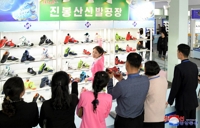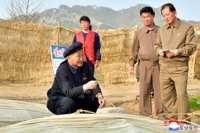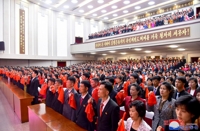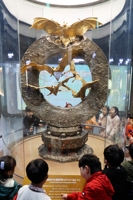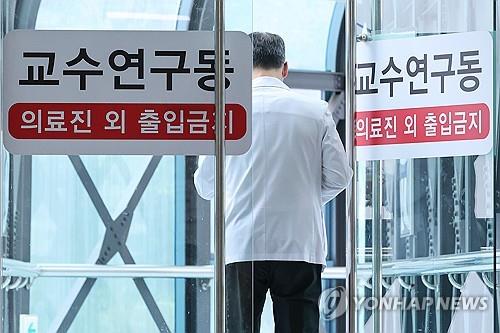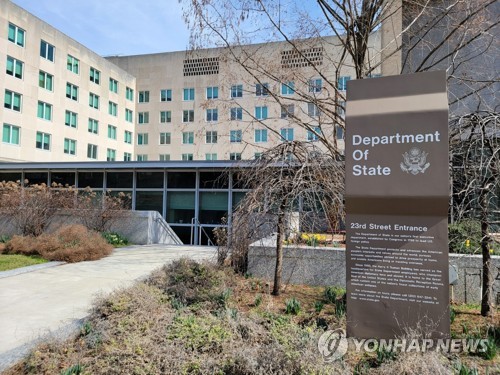(Yonhap Interview) Ex-U.S. nuclear envoy says military drill suspension is 'powerful' confidence-building measure
By Song Sang-ho
SEOUL, June 22 (Yonhap) -- A former U.S. nuclear negotiator on Friday dismissed concerns about the recent decision by Seoul and Washington to suspend their major summertime military exercise, calling it a "powerful" measure to build confidence with North Korea.
Joseph R. DeTrani also voiced guarded optimism regarding ongoing diplomacy centering on the communist state, citing a flurry of positive developments, such as the June 12 summit between U.S. President Donald Trump and North Korean leader Kim Jong-un
"I don't think it is too much of a concession. It is something that could be reconstituted. ... It is a powerful one where the ROK and the U.S. agreed to halt that," he told Yonhap News Agency on the sidelines of an intelligence forum in Seoul. ROK stands for Republic of Korea, South Korea's official name.
"It is more than a gesture. It is a powerful deliverable to North Korea to say we are not hostile and we are prepared to move forward in a positive way, assuming that you are serious and you move forward," he added.
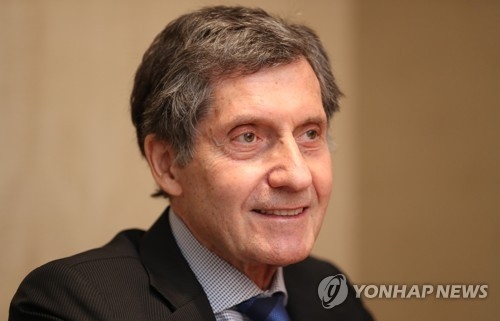
Joseph R. DeTrani, former U.S. deputy nuclear negotiator, speaks during an interview with Yonhap News Agency in Seoul on June 22, 2018. (Yonhap)
On Tuesday, Seoul and Washington announced their joint decision to suspend the Ulchi Freedom Guardian exercise, slated for August, as a good-will gesture to facilitate dialogue to denuclearize the North.
The decision was in line with U.S. President Donald Trump's surprise pledge to stop "provocative, inappropriate and expensive" war games with the South, which Pyongyang has decried as an invasion rehearsal.
DeTrani brushed aside concerns that the suspension of the key exercise, central to the decadeslong security alliance, would undermine the two militaries' readiness posture and deterrence capabilities.
"That doesn't mean that we are not doing anything between our militaries with the joint command and other things. There are other avenues to ensure that our military is prepared," the former negotiator said.
Asked what he would demand if he were to be reinstated as a nuclear envoy, he called for a stop to the North's production of fissile materials.
"They halted the nuclear tests and missile launches. Okay ... stop, if you will, reprocessing spent fuel rods, stop enriching uranium. No more fissile material," he said.
"There are a lot of reciprocal steps North Korea can take to show that they are serious and they want to be forthcoming."
Commenting on the prospect of the U.S.' negotiations with the North, DeTrani noted that they would go beyond just denuclearization to include the normalization of bilateral ties, which Pyongyang wants as part of security assurances.
"Economic development, better livelihood for the people. ... You know, basic to that is the normal relationship with the U.S. and access to the U.S financial institutions. When you have access to the U.S. financial institutions, then the global financial markets will open up to you," he said.
"But to get normal relations with the U.S. is not just denuclearization. It is human rights and it is illicit activities -- counterfeiting our currency, cigarettes and pharmaceuticals, and dealing with drugs. That would be part of a normalization process," he added.
Touching on the worries that escalating trade friction between Washington and Beijing could adversely affect their cooperation on the North's disarmament, Detrani pointed out that the nuclear and trade issues are separate.
"I think we've worked well (with China) and trade is another issue. I really don't think we should conflate the two," he said. "I don't think China or we should use trade as a leverage to influence the other on North Korea. ... We have similar interests on the denuclearization. China doesn't want North Korea to have nuclear weapons."
As for ongoing and future negotiations with the North, DeTrani remained sanguine.
"There is a lot of skepticism out there. I'm not one of them. I would say (I am) guardedly optimistic. ... I tend to be optimistic on this because it has taken us a long time to get where we are now," he said.
On Friday, DeTrani attended the Global Intelligence Summit hosted by the Institute for National Intelligence Strategy, a think tank under the National Intelligence Service.
sshluck@yna.co.kr
(END)
-
 Ateez member Yunho throws first pitch at MLB match between Dodgers, Mets
Ateez member Yunho throws first pitch at MLB match between Dodgers, Mets -
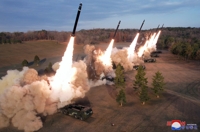 N. Korea says Kim guided simulated nuclear counterattack drills for 1st time
N. Korea says Kim guided simulated nuclear counterattack drills for 1st time -
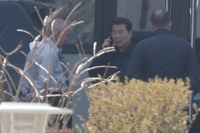 N. Korea calls envisioned U.S. aid to Ukraine 'hallucinogen'
N. Korea calls envisioned U.S. aid to Ukraine 'hallucinogen' -
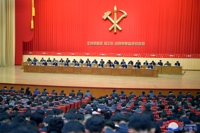 N. Korea calls on party propaganda officials to work harder
N. Korea calls on party propaganda officials to work harder -
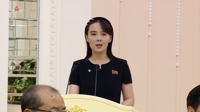 N.K. leader's sister slams joint S. Korea-U.S. military drills
N.K. leader's sister slams joint S. Korea-U.S. military drills
-
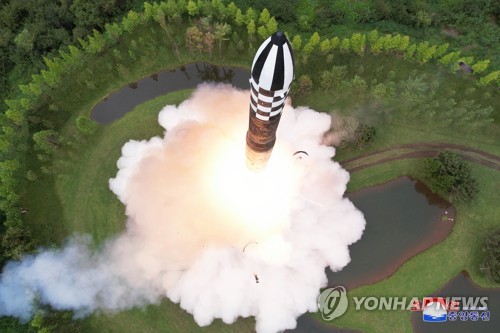 Experts see possibility of N.K. conducting nuclear test before U.S. presidential vote
Experts see possibility of N.K. conducting nuclear test before U.S. presidential vote -
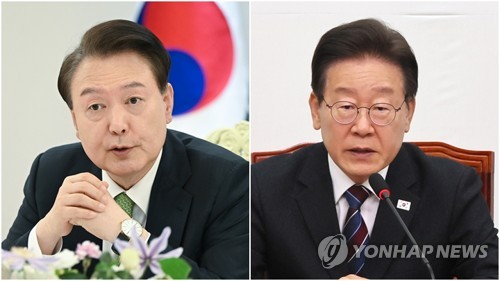 Details of meeting between Yoon, opposition leader undecided: presidential office
Details of meeting between Yoon, opposition leader undecided: presidential office -
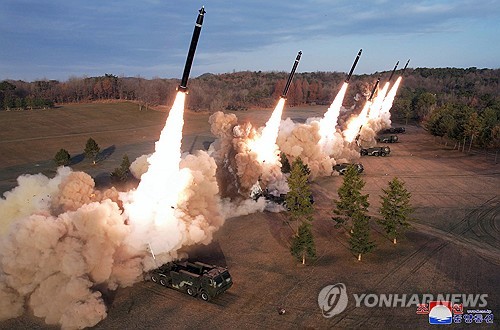 N. Korea says Kim guided simulated nuclear counterattack drills for 1st time
N. Korea says Kim guided simulated nuclear counterattack drills for 1st time -
 Looming weekly closure of major hospitals feared to worsen medical service crisis
Looming weekly closure of major hospitals feared to worsen medical service crisis -
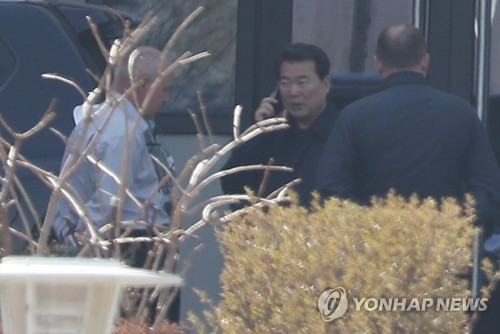 N. Korea calls envisioned U.S. aid to Ukraine 'hallucinogen'
N. Korea calls envisioned U.S. aid to Ukraine 'hallucinogen'
-
 (LEAD) Hybe to file complaint against sublabel executives over internal conflict
(LEAD) Hybe to file complaint against sublabel executives over internal conflict -
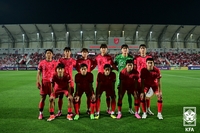 10-man S. Korea lose to Indonesia to miss out on Paris Olympic football qualification
10-man S. Korea lose to Indonesia to miss out on Paris Olympic football qualification -
 S. Korea reports highest suicide rate, ultra fine dust level among OECD nations: data
S. Korea reports highest suicide rate, ultra fine dust level among OECD nations: data -
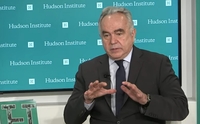 U.S. will take steps for three-way engagement on nuclear deterrence with S. Korea, Japan: Campbell
U.S. will take steps for three-way engagement on nuclear deterrence with S. Korea, Japan: Campbell -
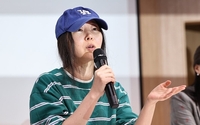 (3rd LD) Hybe to file complaint against sublabel executives over internal conflict
(3rd LD) Hybe to file complaint against sublabel executives over internal conflict















